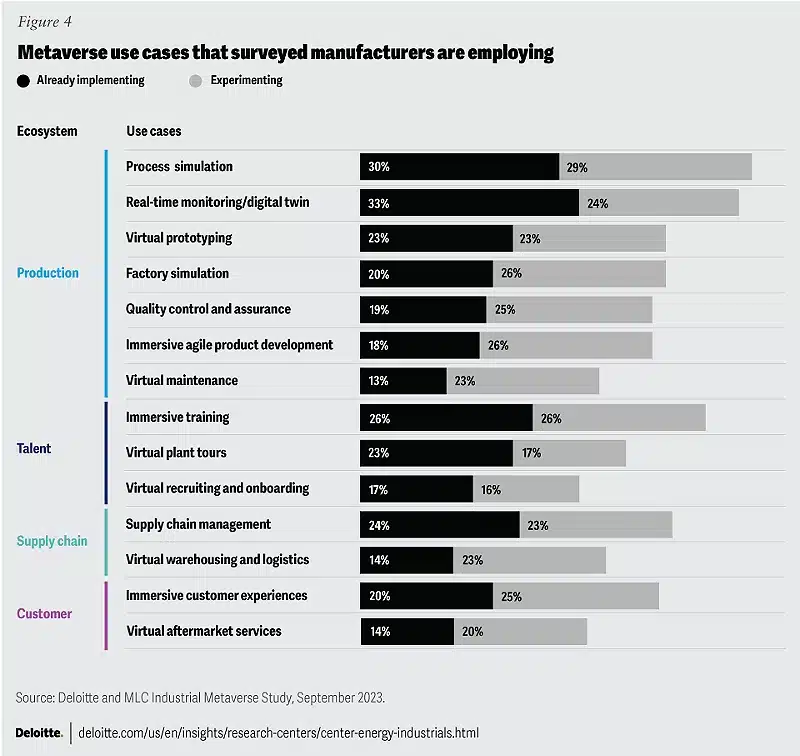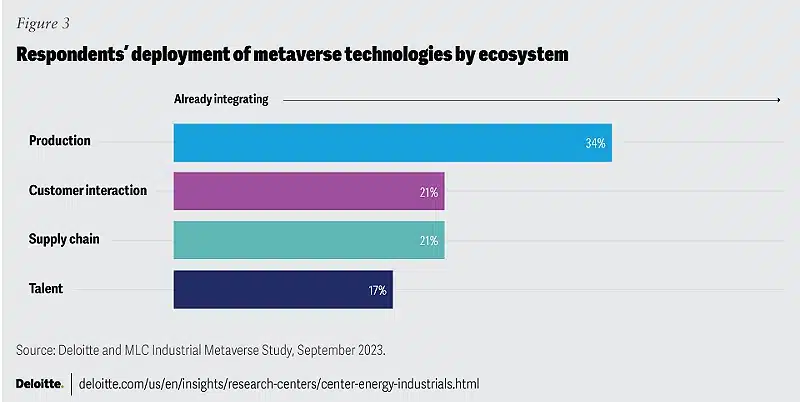Recent insights from Deloitte indicate that a staggering 92% of manufacturing firms are leveraging the industrial metaverse for various applications.
In Brief
Deloitte's research indicates that 92% of surveyed manufacturers are currently testing or have begun implementing at least one use case within the metaverse.
More than 70% of manufacturing leaders believe that the industrial metaverse will contribute positively to their revenue streams.

Today, Deloitte unveiled the results of its Industrial Metaverse Study This study discusses the infusion of the industrial metaverse within the manufacturing sector. Deloitte describes the industrial metaverse as the blending of various technologies to create immersive, three-dimensional virtual environments, either alone or in conjunction with physical spaces.
Deloitte expects that as technology advances, access to these immersive 3D spaces will be made possible from any device with internet connectivity. This includes virtual reality (VR), augmented reality (AR), smartphones, tablets, laptops, and other tools, regardless of where one is located.
John Coykendall, Deloitte's Vice Chair and U.S. leader for industrial products and construction, remarked that the rapid rise of smart manufacturing has laid a solid groundwork for recognizing the potential advantages that metaverse-related technologies can deliver.
Coykendall further noted that businesses that embrace progressive technological innovations along with adaptability and flexibility will set themselves apart and open up new avenues for growth.
The study from Deloitte shows that 92% of the manufacturing executives surveyed are actively engaged in experiments or implementations that involve various aspects of the metaverse.
The most frequent area for metaverse applications within the production ecosystem has been identified as building on existing smart factory initiatives and utilizing foundational technologies already established. The report reveals that more than one-third of participants are integrating these metaverse technologies, with customer, supply chain, and talent ecosystems following closely behind.
An independent research firm conducted Deloitte’s survey in May, gathering input from over 350 senior executives operating within the U.S. manufacturing sector. These findings were complemented by a series of interviews with technology leaders conducted in June.

Broad Applications Across Key Manufacturing Domains
Deloitte points out that the metaverse isn’t a universal solution; instead, it provides varied applications across four key industrial domains:
- Production (34%): Manufacturers are utilizing the metaverse to enhance production efficiencies and precision.
- Customer Interaction (21%): This technology enables immersive customer experiences, deepening engagement and connection.
- Supply Chain Design (21%): Companies are employing metaverse technologies for supply chain enhancement, promoting resilience and visibility.
- Talent (17%): The metaverse is being utilized by manufacturers to recruit, train, and retain top talent in this digital era.

Manufacturers are optimistic about the metaverse’s potential. The survey finds that 74% of respondents expect it to enhance their revenues, while 55% foresee reductions in costs.
Moreover, the report reveals that around two-thirds of those surveyed believe that the industrial metaverse will significantly transform business operations, collaboration, and virtual experiences within the next five years. Additionally, nearly 40% plan notable expansions in their use of metaverse tools.
Challenges and Risks
Despite the clear benefits presented by metaverse-enhanced technologies, there are potential obstacles to consider. Some of the primary challenges include:
- Implementation Costs (51%): Managing the expenses linked to adopting metaverse technologies.
- Talent Shortages (50%): Finding and keeping skilled professionals who possess the necessary digital expertise.
- Integration Challenges (45%): The seamless incorporation of metaverse technologies with pre-existing systems.
- Cybersecurity remains a critical concern, with 72% of respondents citing it as a major risk. Nevertheless, manufacturers seem confident that the benefits of the industrial metaverse will surpass the cybersecurity challenges, particularly if robust strategies for risk management are established.
Last November, Renault launched As the first industrial metaverse takes shape, it’s important to note that not every endeavor in this domain has succeeded. For example, Microsoft decided to shut down its industrial metaverse initiative after only four months, back in February.
Disclaimer
In line with the Trust Project guidelines Please remember that the content presented on this page is intended for informational purposes and should not be viewed as legal, tax, investment, or financial advice. Always invest wisely and consult with a financial advisor if you have any uncertainties. For more details, we recommend reviewing the terms and conditions and the support resources provided by the advertiser. MetaversePost commits to delivering accurate and unbiased news, but market dynamics can shift without notice.







